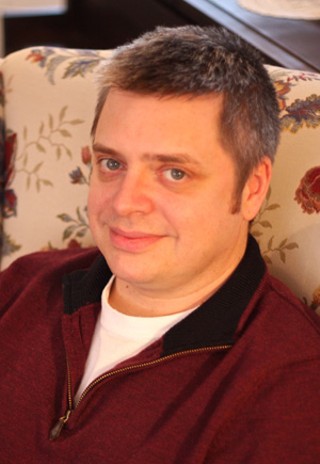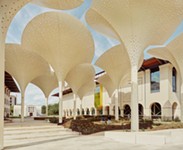As He Lay Dying
From deathbed to spiritual rebirth in the Pulitzer Prize-winning 'Tinkers'
By Kimberley Jones, Fri., Sept. 24, 2010

The inner workings of clocks. The foliage of New England farmland, season to season. The terrorizing buildup to an epileptic fit. Debut novelist Paul Harding is an obsessive cataloguer. You could probably spell out Tinkers' slim plot in a sentence or two – a clockmaker named George Crosby, on his deathbed, remembers his father, Howard, a salesman with the heart of a poet. But the dramatic heft of the novel, which nabbed an under-the-radar win for this year's Pulitzer Prize for Fiction, is in the breath-catching power of Harding's prose. It's a short book, squat in design and running only 196 pages, but those 196 pages are something to savor.
The Chronicle recently traded e-mails with Harding in advance of his Austin appearance on Sept. 30, as part of the Michener Center for Writers Reading Series.
Austin Chronicle: The book mostly alternates between the perspective of George on his deathbed and Howard as a tinker. There's a very stark contrast between George's present-day existence, confined to a single room, and Howard's roaming in the natural world. Was one easier than the other to tackle?
Paul Harding: The experience of writing the characters –their settings, their voices –was complementary. Whenever one started to feel claustrophobic or too far-ranging, I switched to the other. Hopefully, the two combined gives a satisfying whole. Circumstances sort of force each man into relative extremes, especially George, but I have the ability to wander around in the woods for entire days on end as well as to lie on the couch reading and napping and riding the updrafts of consciousness.
AC: The three generations of Crosby men could all be seen as failed storytellers: the preacher whose sermons grow increasingly unintelligible; the unpublished poet; and the would-be memoirist who burns the tape after the shock of hearing his voice. Is this a glimpse at the frustrations of writing – knowing the poetry, or possibility of it, is there, but being stymied in the attempt to put it on the page?
PH: Generally, yes, the phenomenon of being frustrated in getting what's in your mind into language, onto the page is certainly baked into the book. But I never thought about the subject deliberately. Or, maybe I did think about it deliberately, but not thematically, or in such particular, meta-fictional terms. I'm concerned with the larger experience of the discrepancies between what we know and how we feel, what we desire and what we have, etc.
AC: And while we're on the subject of writing: Clock repair is a running theme in the book. It's methodical, precise, ordered –sort of the antithesis of fiction writing, I imagine. Did the preciseness of clocks give you a kind of clarity when tackling the structure and themes of the book? I had a sort of "duh" moment when I belatedly realized the very first line – "George Washington Crosby began to hallucinate eight days before he died" – that it was mimicking the number of days it takes for a clock to wind down.
PH: I, too, had the same "duh"moment. I can't remember the phrasing, but the opening line of the book was generic until very near the end of writing –something about George beginning to hallucinate "not long before he died"or something similarly wan. The clock thing happened once I realized that it was his own metaphor for himself and for his own desires for the world, his desired cosmology. He had such a traumatic, chaotic upbringing, that the consolations of a clockwork universe were irresistible to him. The book was always structured as a countdown to the instant of the protagonist's death. The eight day period common to a lot of types of clocks just help sharpen the idea a bit, and consolidate some of the imagery.
AC: So, the next novel: A reaction to your first, or a continuation of it?
PH: Hmm. Neither, really. It's still pretty mysterious to me at this point, deep into it as I am. It takes place after the events in Tinkers, but it's not a sequel, per se. The protagonist, Charlie, one of George's grandsons, certainly bears a family resemblance to his forebears, and they are part of his well of experience, and, I suppose, the book continues to mine my own aesthetic and thematic preoccupations. So, maybe an evolution rather than a reaction or continuation.
Paul Harding will read Thursday, Sept. 30, 7:30pm at the Avaya Auditorium (ACES 2.302) on the University of Texas campus.








